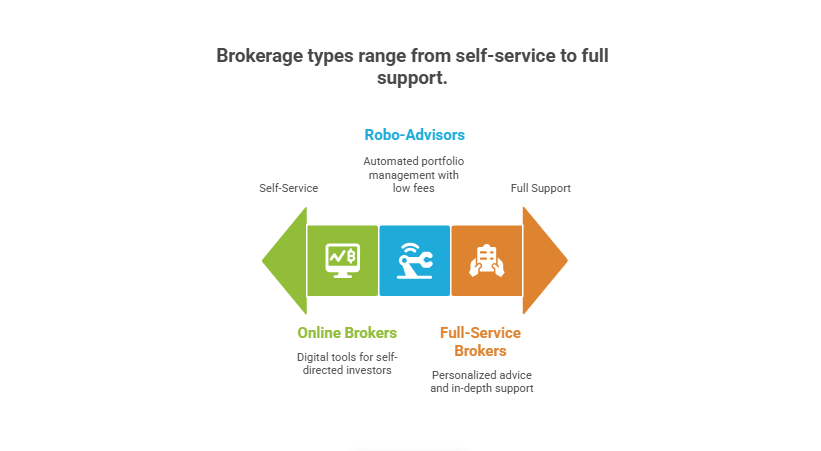
Best Brokers for Beginners: What We Wish We Knew
Investors seeking clarity on what are brokerage services often discover a complex yet crucial aspect of wealth management. Brokerage services involve connecting buyers and sellers in financial markets—brokers help facilitate the purchase and sale of securities such as stocks, bonds, or mutual funds. Working through a brokerage account can provide an efficient route to grow one’s portfolio, especially for high-net-worth individuals looking to optimize their asset strategies.
Defining Brokerage Services

Brokerage services link investors and financial markets. Firms in this sector may be not-for-profit entities or large commercial institutions, but they all share a mission: efficiently match buyers and sellers while providing tools and guidance for trading. In many cases, brokerage platforms also offer portfolio management, research resources, and comprehensive support. In the United States, bodies like the Financial Industry Regulatory Authority (FINRA) help oversee these services to ensure fair and transparent practices.
Many investors choose to open an individual investment account with a brokerage, because these accounts carry no contribution limits and can hold a wide range of assets. For added background on fundamental investment concepts, individuals can visit investment education to grasp how securities fit into larger wealth-building strategies.
Examining Common Brokerage Types

Brokerages vary in their services and fee structures. Some cater to a lean, do-it-yourself experience, while others focus on personalized advice.
- Online or Discount Brokers: These platforms usually charge lower fees or even zero commissions for trading. They are well-suited to self-directed investors who prefer digital tools.
- Full-Service Brokers: This category provides in-depth support, including market research, estate and tax planning, and investment consultations. Such elevated services often come with higher fees.
- Robo-Advisors: Automated platforms that use algorithms to manage portfolios. They tend to charge low advisory fees, appealing to those comfortable with minimal human intervention.
When selecting a brokerage, many individuals evaluate offerings such as real-time investment tools, research databases, or specialized support. Beginner investors may benefit from exploring the best brokers for beginners to find user-friendly options.
Understanding Brokerage Fees

Brokerage fees cover the transaction and advisory services offered by brokers. According to Investopedia, charges can come as flat commissions, percentage-based fees, or a blend of both. Full-service brokers might demand 1–2% of the managed assets per year, whereas discount platforms often charge less. Some brokerages impose fees for specific features, such as premium research tools or specialized account types.
Keeping an eye on how these costs can add up is essential. Frequent traders might face per-trade commissions, and mutual fund transactions can also carry fees. Investors seeking to understand the full picture behind these transactions sometimes consult resources like understanding investments to learn how fees influence returns over time.
Exploring Regulatory Oversight

Brokerage firms are closely monitored by regulatory authorities to protect investors. The Securities and Exchange Commission (SEC) enforces rules that govern brokers, ensuring publicly traded companies disclose essential information. FINRA sets guidelines for ethical practices, minimizing potential conflicts of interest. These regulations help maintain transparency, so investors know how their capital is managed and what protections apply in instances of brokerage failure.
Key Considerations For Investors

Wealthy individuals often want customized advice, especially if managing large liquidity events or concentrated stock holdings. Choosing the right brokerage hinges on personal goals, risk tolerance, and service expectations. Some may prioritize fee-only fiduciary relationships, while others prefer robust digital tools for tracking performance. Investors might also explore how to form more structured strategies, such as learning how to form an investment fund or seeking investors for business.
Most high-net-worth individuals exploring what are brokerage services share five core questions in a single breath: “Are these accounts insured, how do fees differ among providers, is a discount brokerage always cheaper, what role does the SEC or FINRA play in oversight, and can they combine multiple account types under one firm?”
By asking focused questions and comparing platforms, investors can select a brokerage that aligns with their long-term vision. Whether through a discount broker, full-service firm, or a mix of specialized services, the right choice supports portfolio growth and preserves wealth for future generations.
A strategic approach—combined with a thorough understanding of available tools—can help investors maximize their returns. Those serious about boosting their knowledge might find it helpful to learn how to invest in privately held companies to round out their overall investment goals.
Showcase your recognition by adding our award badge to your website! Simply copy the code below and embed it on your site to highlight your achievement.

Recent Posts
Investment Firms in Los Angeles to Consider
Los Angeles is home to a diverse and dynamic financial...
Investment Firms in New York to Consider
Choosing the right investment firm is crucial for achieving your...





